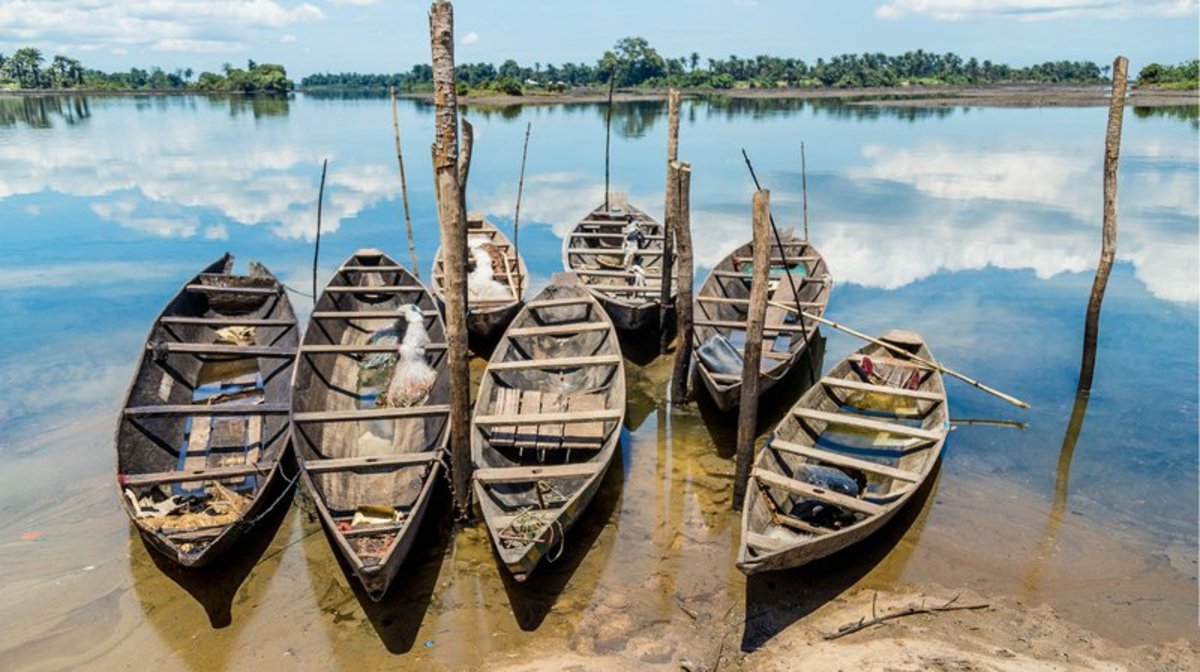
Ogoniland, situated off the coast of the Gulf of Guinea in southeastern Nigeria, is considered the most polluted region along the Niger Delta and among the worst in the world.
Even though the Niger Delta is rich in resources, poverty, pollution and unemployment are rife. One of its primary resources is oil, and consequently, many companies take advantage of the region. According to the United Nations Environment Programme (UNEP), the oil industry has been a key factor in Nigeria’s economy for 50 years. As a result of oil drilling and spills by Shell and other companies, however, the land has been devastated, the vegetation decimated, fish numbers depleted, and surrounding mangroves, swamps and creeks contaminated. Consequently, the livelihoods of many fishermen and farmers have been destroyed.
In 2011, the UNEP said that it could take up to 30 years for full environmental restoration to be achieved in Ogoniland; but a lack of accountability appears to have stalled progress as corruption and violence spread, and mistrust continues to grow between the people and the government.
Cleaning up the Niger Delta remains a key focal point for Chinyere Nnadi, founder and CEO of Sustainability International, a U.S.-based nonprofit that provides innovative solutions to complex sustainability and conservation issues in the developing world. Sustainability International’s current large-scale initiative hopes to revitalize the region through its Clean Up Niger Delta Project.
Speaking to Bitcoin Magazine, Nnadi, whose family comes from Nigeria, said that it’s important to understand the full scope of this Gordian knot before reaching a resolution, and to raise awareness around the effects caused by the oil pollution.
“Over the years, we’ve taken numerous meetings [with] local villages, government officials, and oil and gas companies to fully understand each stakeholder’s concerns and challenges,” he said. “During this process, the situation became more volatile and dangerous with rising ethnic tensions and youth violence.”
Nnadi explains that since Nigeria fell into recession a year and a half ago, violence and unrest have risen sharply in the region. Several militant groups comprising of disaffected youth with no job prospects were regularly bombing oil pipelines until a truce in September 2016. In one explosion alone, Shell lost $7 billion. The Nigerian federal government is estimated to have lost $100 million in oil revenue from the oil and gas pipeline bombings as it lost control over the Niger Delta region.
“The truce ended two weeks ago and the Nigerian army and navy have entered the region to protect the oil and gas assets and combat the militants,” explained Nnadi. “In the last two weeks there have been multiple killings and kidnappings.”
Nnadi says that there has never been a cleanup of the oil spills in the Niger Delta, culminating in 50 years of neglect and lack of accountability among oil and gas companies, wealthy elites and the government. Consequently, as sentiment is changing toward solving the problem, all the parties — the government, oil companies and the community — no longer trust each other, says Nnadi.
“This presented the opportunity to experiment with the blockchain at the community level,” he added. “We have their trust, and that is what is most important at the moment.”
As such, Sustainability International is planning to launch multiple controlled pilots in one village over the next year. Nnadi said they will conduct interviews with the villagers to determine the best design application for the people. They will then use their findings to develop the alpha version of mobile and desktop applications before executing cleanup number two, employing “wetware” — human know-how merged with advanced technology.
“Our pilots will begin with one farm, then expand the cleanups to multiple farms at a time by the third cleanup, using hardware and blockchain [technology] to efficiently execute multiple cleanups,” he said. “Using decentralization, we will enable distributed data collection and secure payments to villages, engineering accountability, economic inclusion and community engagement.”
Through the blockchain, Sustainability International will be able to micropay community members as they build credibility through its reputation system that rewards honest work. It’s hoped that this will rewire a society that is rampant with bribery and corruption. In turn, interaction with international NGOs that are seeking to engage with young entrepreneurs and community leaders in Africa’s largest country will be made easier.
Sustainability International has teamed up with the Blockchain for Social Impact Coalition (BSIC), an initiative started by ConsenSys.
Ben Siegel, impact policy manager at ConsenSys, told Bitcoin Magazine that the blockchain aspect of Sustainability International’s project creates an added level of trust in the platform.
“The individuals on the ground don’t need to trust each other; they just need to trust the platform/system,” he said. “It reduces the fear of corruption that can sometimes drive people away from integrity.”
Sustainability International and the blockchain coalition will use smart contracts to prevent corruption and return trust back to Ogoniland.
“With smart contracts and cryptocurrency, we can create ‘programmable money,’ which allows us to then ‘program’ human actions,” added Siegel. “If we incentivize people to continuously perform a series of tasks in order to receive a sustained flow of funds, we might be able to create a system in which the most likely ‘corrupt’ actors are incentivized for not being corrupt.”
This means that if Shell were to allocate a set amount of money to clean up an oil spill, the money wouldn’t be released to the contractor until the work has been verified as complete. Through smart contracts, the contractors and the community would monitor the cleanup, with each submitting data to show efficacy of work. The community would also be trained in International Sustainability standards, in which multiple factors of authentication are needed on the data submission to ensure secure data is used, Nnadi explained.
“We also run a sentiment tracker and smartphones in the entire community throughout the length of the project to have an extra level of confirmation and community engagement,” added Nnadi.
Nnadi expects the cleanup will be a massive development opportunity for local communities.
“The central thesis of this technology experiment is that the government and oil companies should pay the people to perform the cleanup,” he said. “We believe that instead of the money being spent on foreigners to come in intermittently to check on the cleanup, that local decentralized data collection will provide cheaper real-time monitoring for the oil companies and governments.”










